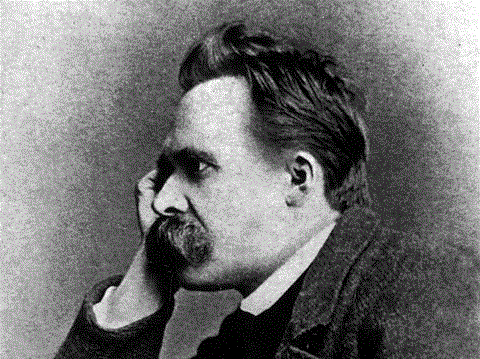
In times of deep distress I’ve often found the brutal, unsparing candor of Friedrich Nietzsche a strange comfort. While wholly enamored of the aristocratic, Hellenistic past of literary invention, the often bilious German philosopher nonetheless had no illusions about the nature of power, which does as it will and is not held in check by what we take for common values. In Nietzsche’s diagnosis, no set of values—or what he calls in The Genealogy of Morals “moral prejudices”—is ever disinterested, transcendent or “disconnected.” Instead, wrote Nietzsche, the language of traditional morality is generally synonymous with the language of power, thus:
The master’s right of giving names goes so far that it is permissible to look upon language itself as the expression of the power of the masters: they say “this is that, and that,” they seal finally every object and every event with a sound, and thereby at the same time take possession of it.
It is “because of this origin,” writes the contrarian Nietzsche, “that the word ‘good’ is far from having any necessary connection with altruistic acts, in accordance with the superstitious belief of these moral philosophers.” Nietzsche described Christianity as “hostile to life” and called for a “revaluation of all values,” excoriating Judeo-Christian beliefs as “slave morality.” The radical iconoclasm expressed in works like The Genealogy of Morals sits side by side with what can seem like the most reactionary valorizations of “nobility” and hierarchy. Nietzsche may have had nothing but contempt for liberal, bourgeois society, but he did not seek to replace it with egalitarian socialism or anything of the kind. It is this sometimes jarring contrast between his seemingly rightist politics and his unsystematic dismantling of the ideological mechanisms by which state power justifies itself that make Nietzsche such a confusing philosopher, one so easily misinterpreted and misread.
The most famous misreading of Nietzsche was a deliberate one, orchestrated by his anti-Semitic sister Elisabeth, friend and admirer of Hitler, who corrupted her brother’s late work and adapted it to Nazi ideology. And yet, despite Nietzsche’s seeming disdain for what he vaguely termed, among other things, an “under race” of common people, he also loathed anti-Semitism and nationalism and would have been infuriated to see his work used as it was by German and Italian fascists. Later readings of Nietzsche, like those of the late Walter Kaufmann or Nietzsche scholar and philosopher Babette Babich, place him in dialogue with Hegel, Kant, and Aristotle, and with the Existentialists. Nietzsche has been called an existentialist thinker himself, as well as a pragmatist, naturalist, and pre-postmodernist—all designations that get at important aspects of his thought, e.g. his stress on contingency, on the physical basis of thought, and on the relative, perspectival nature of truth.
This very broad overview doesn’t pretend to do justice to the depth and variety of Nietzschean thought. If you wish to understand his work, you should, of course, read it for yourself. And so you can, nearly all of it, online. Below, find links to almost all of the philosopher’s major works, in Kindle, PDF, HTML, ePub, and other formats. For some excellent guides through Nietzsche’s thinking, consider listening to Walter Kaufmann’s 1960 lectures and watching the Nietzsche segment in Human, All Too Human, a 3‑part documentary series that also profiles Martin Heidegger and Jean-Paul Sartre. Professor Babich’s site has links to many of her articles online and the site Nietzsche Circle has a large links section with many helpful resources. But of course, there’s no substitute for the original. Below, in chronological order, find most of the complete works of Friedrich Nietzsche. Ironic, pessimistic, joyous, creative, and scathing, they make for intriguing, frustrating, enlightening, and ultimately life-affirming reading.
-
- The Birth of Tragedy (1872) — Kindle + Other Formats — Read Online Now
- Human, All Too Human (1878) — Kindle + Other Formats – Read Online Now
- The Dawn of Day (1881) — Kindle + Other Formats — Read Online Now
- The Gay Science (1882) — Read Online Now
- Thus Spake Zarathustra (1883) — iPad/iPhone – Kindle + Other Formats
- Beyond Good and Evil (1886) — iPad/iPhone – Kindle + Other Formats – Read Online Now
- On the Genealogy of Morals (1887) — Read Online Now
- The Case of Wagner/Nietzsche Contra Wagner/Selected Aphorisms (1888) — iPad/iPhone – Kindle + Other Formats
- Twilight of the Idols (1888) — Kindle + Other Formats — Read Online Now
- The Anti Christ (1888) — iPad/iPhone – Kindle + Other Formats
- Ecce Homo (1888) — Kindle + Other Formats — Read Online Now
All of these texts appear in our collection of Free Philosophy eBooks as well as in our larger collection, 800 Free eBooks for iPad, Kindle & Other Devices.
Related Content:
Download Walter Kaufmann’s Lectures on Nietzsche, Kierkegaard, Sartre & Modern Thought (1960)
Human, All Too Human: 3‑Part Documentary Profiles Nietzsche, Heidegger & Sartre
Free Online Philosophy Courses
Josh Jones is a writer and musician based in Durham, NC. Follow him at @jdmagness


Hi,
Thanks for this awesome list; both it and this site are really great resources.
I’ve got a quick correction for you: the “Ecce Homo” linked above is to a text by Baron d’Hollbach and not Nietzsche. The Nietzsche text may be found here:
https://archive.org/details/eccehomo00niet
I am interested in reading his views on aesthetics
Glad to see that there is still some interest in Nietzsche. I found that his “Gay Science” translated by Walter Kaufmann to be the most excellent book that i had read throughout my collegiate career. A master writer of awakening thoughts. Thanks Josh and Dan. I lived in Durham in ’75-’76 while i went to Carolina. The “Joyful Wisdom” link isn’t worth the time spent opening it.
5Q+5Q=…
Despite the current widespread belief that Nietzsche was German, he is unambiguously explicit in identifying himself as Polish in The Antichrist.